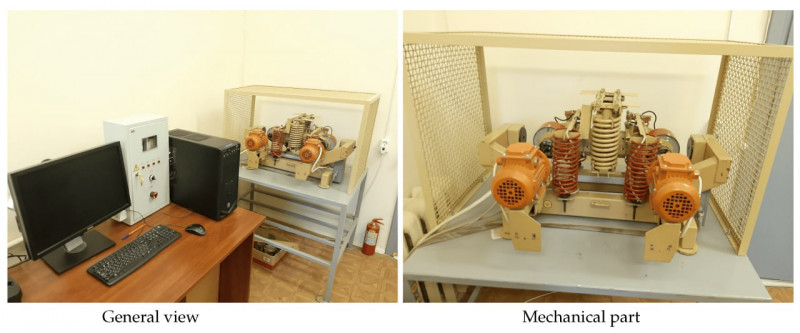IPMash RAS scientists created an algorithm to control vibration for a universal vibration machine
The results of the study were published in Electronics.
A vibrating machine is a device used in the mining and processing industry. Such machines mix various bulk materials under the influence of vibrations of the working surface. Vibrating machines operate on the principle of Huygens clock. The main idea of the Huygens clock is to use a pendulum to ensure a uniform clock rate. The pendulum is suspended from a frame that allows it to swing freely back and forth. The vibrating machine has an unbalanced mass connected to the engine rigidly, and instead of a wooden wall there is a metal base to which the engines are attached. During rotation the machine's unbalanced masses transmit vibrations to the work table on which the processed material is placed. A distinctive feature of the vibration machine being developed at IPMash RAS is its versatility. It can mix various bulk mixtures, transport the material in conveyor mode and generate an asymmetric oscillation shape to «densify» and «eject» the material. Whereas the other machines can only do one thing.

Currently, the scientists are working on improving the software for this machine. So, recently they have created algorithms for automating the equipment for mixing the bulk materials.
“The idea of such an algorithm has already been used in our previous work, but only with a different phase setter. This paper also describes the process of processing highly noisy measured data. When measuring any value with sensors, there is always an error — measurement noise, but in our case, an error from vibration is also added to this. Therefore, the data contains significant interference noise," said Yulia Zaitseva, a researcher at IPMash RAS.
According to her, since the machine does not have vibration sensors, it is possible to control the vibrations through the phase regulator of the unbalanced masses. As shown in the paper, the shape of the vibration fields depends on the magnitude of the phase shift between the unbalanced masses. Using this, it is possible to improve the machine itself constructively and to increase its effectiveness.
The laboratory Digitalization, Analysis and Synthesis of Complex Mechanical Systems, Networks and Environments, where these studies are conducted, was established at IPMash RAS within the framework of a mega-grant of the RF Government.
Areas of work of the laboratory: digital intelligent control of multi-rotor vibration installations, autonomous navigation and control of multi-agent robotic and mechatronic complexes, adaptive control and evaluation for aircraft with high delays and limitations on communication channels, development of methods of digital control over nonlinear spatially distributed systems and strength properties of nonlinear acoustic metamaterials and development of new methods and algorithms for digital adaptive control of continuous distributed systems under conditions of significant disturbances.

